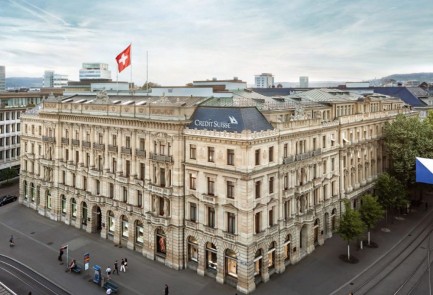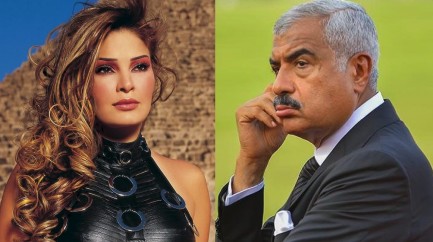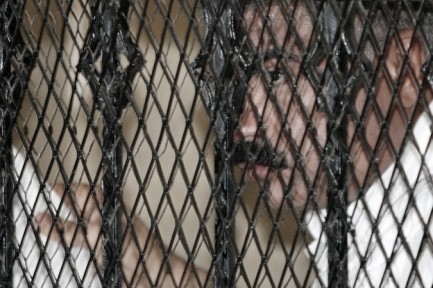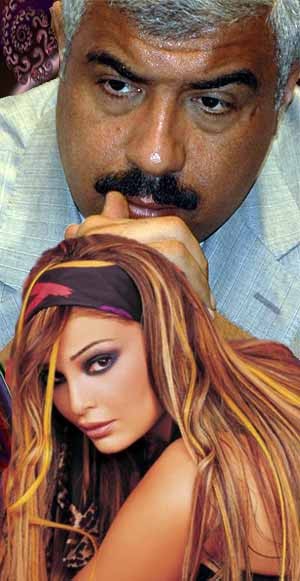 Swiss bank receives long deserved exposure thanks to data leak. 
We're occasionally asked why we don't do modern true crime write-ups as often as we once did. There are a couple of reasons. We actually have jobs, and the research on crime stories is time consuming. But secondly, modern day swindles, scams, and corruption are out of control to the extent that writing about them seems redundant. But we're making an exception today because one of our previous subjects, who we wrote about way back in 2009, has popped up in the news again. That would be Hisham Talaat Moustafa, who was sentenced to death for hiring out the murder of his ex-girlfriend, Lebanese pop star Suzanne Tamim. His was one of thousands of names just revealed in a massive financial data leak from Credit Suisse, one of the most prestigious banks in Switzerland, which hides money for the richest people in the world.
We think everyone knows Swiss banks are corrupt, right? Their first secrecy laws were adopted in 1713. It's safe to say they've been corrupt for almost that long. Over the years Credit Suisse's clients have included Ferdinand and Imelda Marcos, who stole $10 billion from the Philippine treasury, Romanian dictator Nicolae Ceausescu, Panamanian drug lord and CIA informant Manuel Noriega, thousands of Nazis who were hiding their expropriations, and countless shady shell companies. One can insert the usual objections about taxes here, but the point is that regular people must pay them, yet the rich and powerful somehow always manage to avoid their fair share, even when they've generated their loot through illegal or even genocidal means. As with many morally rudderless institutions and people, what Swiss banks do is perfectly legal, but “perfectly legal” is the phrase uttered by people who know they're willfully engaged in behavior that obviously should be illegal—and in fact is illegal for everyone but the rich and connected. people must pay them, yet the rich and powerful somehow always manage to avoid their fair share, even when they've generated their loot through illegal or even genocidal means. As with many morally rudderless institutions and people, what Swiss banks do is perfectly legal, but “perfectly legal” is the phrase uttered by people who know they're willfully engaged in behavior that obviously should be illegal—and in fact is illegal for everyone but the rich and connected.
Credit Suisse is trying to pretend that the leak reveals old accounts from before the bank cleaned up its practices (which it never substantially did), but the spin won't be effective because the data reveals that the bank is currently holding money for human traffickers, drug lords, oligarchs, stock cheats, treasury looters, mafia kingpins and—in the case of Hisham Moustafa—murderers. Correction—pardoned murderers, since he was released thanks to presidential decree in 2017. The information on all this corruption was originally passed to the German newspaper Süddeutsche Zeitung via an anonymous whistleblower, and the odds are good that in a matter of weeks or months that currently unknown person will be outed and have to make a full time job of trying to avoid the total destruction of his or her life and a prison sentence—no pardon pending.
Tax and corruption problems have exploded globally as elite greed has grown, the profits from criminality have soared, digital technology has created previously-unheard-of fortunes, offshoring of profits has become standard practice, deregulation and the de-facto dissolving of anti-trust laws have allowed corporations to grow more powerful than countries, and austerity has shrunk or eliminated the enforcement mechanisms of public institutions. In fact, in addition to funneling money from regular people to corporations and the rich, the other point of austerity is to shrink government to prevent it prying into the affairs of corporations and the rich. Libertarians rejoice. Insider trading, commodities fraud, and money laundering are all now rampant, and there's nothing people can do about it because the government institutions meant to be centers of oversight were taken over by the rich decades ago.
Moustafa paid to have his girlfriend knifed to death. Unlike murderers able to hide behind the fig leaf of non-conviction, his guilt was established as a fact during a criminal court proceeding. He was sentenced to hanging but was retried and had his punishment reduced to a mere fifteen years. He spent, in total before his pardon, nine years in a country club prison, and all the while managed his wealth, built up his billions, and came out of jail not disgraced and shunned, but welcomed, feted, and once again demanding and receiving VIP treatment, the best tables in the best restaurants, and the ear of the global elite. He threw a few coins to charity along the way to spit-shine his reputation, had his thriving conglomerate Talaat Moustafa Group donate some COVID vaccines, but still he's a murderer who wriggled loose from the hangman's noose, and today enjoys every privilege he ever enjoyed—while his victim is dead forever. came out of jail not disgraced and shunned, but welcomed, feted, and once again demanding and receiving VIP treatment, the best tables in the best restaurants, and the ear of the global elite. He threw a few coins to charity along the way to spit-shine his reputation, had his thriving conglomerate Talaat Moustafa Group donate some COVID vaccines, but still he's a murderer who wriggled loose from the hangman's noose, and today enjoys every privilege he ever enjoyed—while his victim is dead forever.
This is the place in which we find ourselves. We all understand, if we actually absorb factual information rather than apologist propaganda or fanciful myth, that the rich have fucked up this world, and the rest of us, as well as future generations, are going to pay to clean up the mess. If it can even be cleaned up, which is doubtful. And that's why we stopped writing about modern crime and corruption. It's pointless. It's banal. Writing about old crimes is an escape, a window into history and the mad hearts of men and women who are long, long gone. Writing about current crimes is self-flagellation. We'll still do it on occasion when the urge strikes, like today, but we're well aware that people tend to complain more as time goes by and we don't want to fall into that trap. We want Pulp Intl. to be a place of entertainment and wonder—by which we mean amazing art, exciting fiction, bizarre historical and Hollywood facts, and beautiful women.
 Egyptians are reminded that in their country, as in all others, money talks and billionaires walk. 
Billionaire Egyptian Hisham Talaat Moustafa has taken the first step toward avoiding the death sentence handed down to him two years ago for the murder of his ex-lover, Lebanese pop star Suzanne Tamim. We posted on it back then—how Moustafa hired Mohsen Al-Sukkari to jet to Dubai and do away with Tamim, but was tripped up when Al-Sukkari accidentally let himself be caught on security cameras entering and leaving Tamim’s building. Average Egyptians, after Moustafa’s surprising death sentence was announced, were forced to deal with the unsettling possibility that their legal system was not corrupt through-and-through, and that their lifelong cynicism concerning equal justice for both rich and poor had been unwarranted. Well, they needn’t have worried. On Tuesday appeals judge Adel Abdel-Salam Gomaa left peon Al-Sukkari’s death sentence in place but reduced billionaire Moustafa’s sentence to fifteen years, even though under Egyptian law contracting for a murder is deemed equivalent to committing one. Most observers, cynicism fully restored, believe the sentence reduction is only the first of several steps toward freeing Moustafa. The judge is legally bound to detail the reasoning behind Tuesday's decision, but with a sixty day grace period to work with he has the luxury of choosing a day when his explanation will make the least impact. Meanwhile Al-Sukkari’s defense attorney—his client now left to face death alone—summed up events by commenting, “I’m 72 years old and throughout my long career as a lawyer I have never witnessed such an incident.” Moustafa. The judge is legally bound to detail the reasoning behind Tuesday's decision, but with a sixty day grace period to work with he has the luxury of choosing a day when his explanation will make the least impact. Meanwhile Al-Sukkari’s defense attorney—his client now left to face death alone—summed up events by commenting, “I’m 72 years old and throughout my long career as a lawyer I have never witnessed such an incident.”
 Egyptian billionaire calls up an employee and asks for a big favor. 
In Egypt yesterday, billionaire hotel and resort magnate Hisham Talaat Moustafa was sentenced to death by hanging after hiring a hitman to kill his ex-lover, Lebanese pop singer Suzanne Tamim. Tamim was knifed to death at her home in Dubai last year by Mohsen el-Sukkary, a security guard employed at one of Moustafa’s numerous hotels. Moustafa’s involvement became clear through phone records and other evidence, and el-Sukkary’s hand in the crime was determined after he left DNA at the murder scene and was caught on a security camera.
Suzanne Tamim became famous in 1996 after winning an American Idol-style competition, but her career ran into problems, and she split with her manager-husband. Her affair with Moustafa was a closely guarded secret because he is married. When it soured last year Tamim took up residence in Dubai, reportedly to distance herself. Moshen el-Sukkary, who was also sentenced to death by hanging, flew to Dubai after agreeing to a two million dollar fee for his services and tricked Tamim into opening her apartment door by posing as an employee of the property. Once inside, he attacked the singer with a knife and eventually slashed her throat, but not before leaving ample evidence behind, including his own blood.
There had been widespread interest in the case in Egypt—and throughout the Arab world—because the wealthy and highly connected are seen as above the law. It was particularly thought to be true of Moustafa, who is a member of Egypt’s ruling National Democratic Party and is close to President Hosni Mubarak’s youngest son, Gamal. But in a surprising development, Moustafa was stripped of his parliamentary immunity before the trial. Moustafa might still dodge the hangman—his case will be going through a mandatory review by religious authorities, and an appeal to the high court, which means his connections may yet serve him.
|
 |

The headlines that mattered yesteryear.
2003—Hope Dies
Film legend Bob Hope dies of pneumonia two months after celebrating his 100th birthday. 1945—Churchill Given the Sack
In spite of admiring Winston Churchill as a great wartime leader, Britons elect
Clement Attlee the nation's new prime minister in a sweeping victory for the Labour Party over the Conservatives. 1952—Evita Peron Dies
Eva Duarte de Peron, aka Evita, wife of the president of the Argentine Republic, dies from cancer at age 33. Evita had brought the working classes into a position of political power never witnessed before, but was hated by the nation's powerful military class. She is lain to rest in Milan, Italy in a secret grave under a nun's name, but is eventually returned to Argentina for reburial beside her husband in 1974. 1943—Mussolini Calls It Quits
Italian dictator Benito Mussolini steps down as head of the armed forces and the government. It soon becomes clear that Il Duce did not relinquish power voluntarily, but was forced to resign after former Fascist colleagues turned against him. He is later installed by Germany as leader of the Italian Social Republic in the north of the country, but is killed by partisans in 1945.
|

|
|

It's easy. We have an uploader that makes it a snap. Use it to submit your art, text, header, and subhead. Your post can be funny, serious, or anything in between, as long as it's vintage pulp. You'll get a byline and experience the fleeting pride of free authorship. We'll edit your post for typos, but the rest is up to you. Click here to give us your best shot.

|
|


 people must pay them, yet the rich and powerful somehow always manage to avoid their fair share, even when they've generated their loot through illegal or even genocidal means. As with many morally rudderless institutions and people, what Swiss banks do is perfectly legal, but “perfectly legal” is the phrase uttered by people who know they're willfully engaged in behavior that obviously should be illegal—and in fact is illegal for everyone but the rich and connected.
people must pay them, yet the rich and powerful somehow always manage to avoid their fair share, even when they've generated their loot through illegal or even genocidal means. As with many morally rudderless institutions and people, what Swiss banks do is perfectly legal, but “perfectly legal” is the phrase uttered by people who know they're willfully engaged in behavior that obviously should be illegal—and in fact is illegal for everyone but the rich and connected. came out of jail not disgraced and shunned, but welcomed, feted, and once again demanding and receiving VIP treatment, the best tables in the best restaurants, and the ear of the global elite. He threw a few coins to charity along the way to spit-shine his reputation, had his thriving conglomerate Talaat Moustafa Group donate some COVID vaccines, but still he's a murderer who wriggled loose from the hangman's noose, and today enjoys every privilege he ever enjoyed—while his victim is dead forever.
came out of jail not disgraced and shunned, but welcomed, feted, and once again demanding and receiving VIP treatment, the best tables in the best restaurants, and the ear of the global elite. He threw a few coins to charity along the way to spit-shine his reputation, had his thriving conglomerate Talaat Moustafa Group donate some COVID vaccines, but still he's a murderer who wriggled loose from the hangman's noose, and today enjoys every privilege he ever enjoyed—while his victim is dead forever.

 Moustafa. The judge is legally bound to detail the reasoning behind Tuesday's decision, but with a sixty day grace period to work with he has the luxury of choosing a day when his explanation will make the least impact. Meanwhile Al-Sukkari’s defense attorney—his client now left to face death alone—summed up events by commenting, “I’m 72 years old and throughout my long career as a lawyer I have never witnessed such an incident.”
Moustafa. The judge is legally bound to detail the reasoning behind Tuesday's decision, but with a sixty day grace period to work with he has the luxury of choosing a day when his explanation will make the least impact. Meanwhile Al-Sukkari’s defense attorney—his client now left to face death alone—summed up events by commenting, “I’m 72 years old and throughout my long career as a lawyer I have never witnessed such an incident.” 





































































